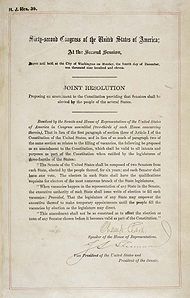
Back Sēofentēoþa Gebētung þære Grundgesetnesse þāra Geānedra Rīca American ANG التعديل السابع عشر لدستور الولايات المتحدة Arabic Сямнаццатая папраўка да Канстытуцыі ЗША Byelorussian Dissetena esmena de la Constitució dels Estats Units Catalan 17. Zusatzartikel zur Verfassung der Vereinigten Staaten German Decimoséptima Enmienda a la Constitución de los Estados Unidos Spanish Ameerika Ühendriikide põhiseaduse seitsmeteistkümnes parandus Estonian متمم هفدهم قانون اساسی ایالات متحده آمریکا Persian Yhdysvaltain perustuslain 17. lisäys Finnish Dix-septième amendement de la Constitution des États-Unis French

| This article is part of a series on the |
| Constitution of the United States |
|---|
 |
| Preamble and Articles |
| Amendments to the Constitution |
|
Unratified Amendments: |
| History |
| Full text |
The Seventeenth Amendment (Amendment XVII) to the United States Constitution established the direct election of United States senators in each state. The amendment supersedes Article I, Section 3, Clauses 1 and 2 of the Constitution, under which senators were elected by state legislatures. It also alters the procedure for filling vacancies in the Senate, allowing for state legislatures to permit their governors to make temporary appointments until a special election can be held.
The amendment was proposed by the 62nd Congress in 1912 and became part of the Constitution on April 8, 1913, on ratification by three-quarters (36) of the state legislatures. Sitting senators were not affected until their existing terms expired. The transition began with two special elections in Georgia[1] and in Maryland, then in earnest with the November 1914 election; it was complete on March 4, 1919, when the senators chosen by the November 1918 election took office.
- ^ "BACON, Augustus Octavius (1839–1914)". Biographical Directory of the U.S. Congress. Archived from the original on February 24, 2020. Retrieved February 24, 2020.
became the first U.S. Senator elected by popular vote following ratification of the 17th Amendment, on July 15, 1913
© MMXXIII Rich X Search. We shall prevail. All rights reserved. Rich X Search